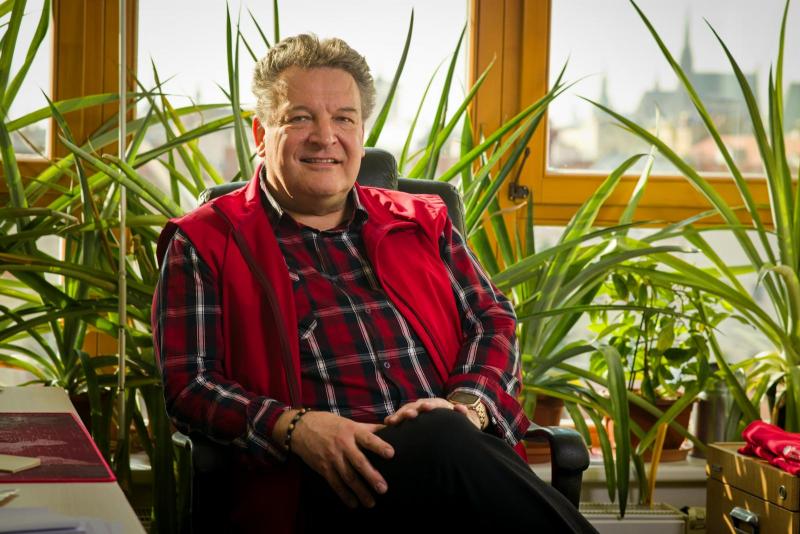People
From oil refineries to charity. FME graduate found his life mission in helping others

Oldřich Haičman graduated from the Faculty of Mechanical Engineering at BUT and originally thought he would work as a designer. The Velvet Revolution and the collapse of the company in which he worked, however, directed him in a completely different direction. He found his life's mission in helping people and has been head of the Brno Diocesan Charity for more than thirty years.
After secondary engineering school, university of the same focus was a simple and clear choice for Oldřich Haičman. He graduated from the Faculty of Mechanical Engineering at BUT and started as a designer of oil refineries. However, after the revolution, the company began to have problems, because it had contracts mainly in the Soviet Union and in Syria. "Instead of refineries, I started designing small bakeries," Oldřich Haičman recalls. But the business eventually went bankrupt and the young designer's life took an unexpected turn. A Charity branch was being established in Brno, and Oldřich Haičman decided to apply for the position of director at the instigation of an acquaintance. "I got the place and managed it myself because I was the only employee at the beginning," he laughs.
Technical education is considered an advantage by the FME graduate
Today, the Charity has over 1,800 employees and a large number of successful projects to help various disadvantaged groups and people in need. And although over the years Oldřich Haičman has completed his education in the field of social work, he does not regret his choice of university. "Having a technical and analytical mindset has always been an advantage here," he says. Being able to think rather pragmatically and having an eye for detail came in handy when managing projects and people. And once he even brushed up on his knowledge of design work. "In Ukraine, they were starting a project of small bakeries, so I was able to advise, because I knew the specifics of how such an operation should work," Haičman recalls.
At the beginning, according to him, the work was a great adrenaline rush. Especially due to the fact that at that time the war in Yugoslavia had started and the Charita workers were driving humanitarian aid to the border. In addition, very soon after its establishment, they established an asylum for mothers with children in Brno. "It still works today," Oldřich Haičman notes, adding that he got inspiration and information about how to actually manage the Charity mainly from colleagues from abroad, for example from Austria. They were also one of the first to launch outreach services for the elderly in South Moravia.
In addition to the shelter and outreach services, over the years, for example, several sheltered housing and a low-threshold center for homeless people have been added. A more complex facility for homeless people is a long-standing dream of Oldřich Haičman. “It is reported that up to seventy percent of the people on the street suffer from some serious mental illness. That's also why, for example, they are usually not able to maintain a regular home in the long term," he says. They dream of a place where they could live, but at the same time they also found help with their psychological problems here. The problem, according to Haičman, is that although Czech society is relatively generous during various disasters or when helping certain groups, it is the homeless who are usually on the sidelines. Therefore, it is not easy to get funding and support to realize such a dream.
People are interested in work despite uncertain funding from the state
Oldřich Haičman considers the financing system of non-profit organizations in the Czech Republic to be a long-term problem. They face a great deal of uncertainty. "Every year we have to wait to see what funding we get. It's very unpleasant, but we've slowly gotten used to it over the years," he says with a smile. Despite this uncertainty, he manages to find new colleagues and fill vacant positions. The only workers that Charita has in the long run less than she would have imagined are health workers. "We need them for hospice services. But that's not for everyone, because it means understanding and empathizing with dying people," Haičman explains.
According to him, the charity also welcomes volunteers, either for specific events or for individual services. And although someone might be deterred by the fear that they must necessarily be religious in order to cooperate with Charity, Oldřich Haičman refutes this fear. "It doesn't have to be just a religious person, it's more important for us what values he holds and why he wants to help," he adds. It was through volunteers that Oldřich Haičman connected with his alma mater. BUT repeatedly participates in events such as Cake for the hospice (Koláč pro hospic) or the Collection of Three Kings (Tříkrálová sbírka).
Heatman Marek Scholler transmits energy not only on stage
Device is being developed at strojLAB that students hope will help them succeed in a prestigious biotechnology competition
Waste is science. Thanks to experts from BUT, the Czech Republic has a forecast of their production
For water of even higher quality. Cavitation and low-temperature plasma technology purifies water from pesticides and hormones
Hybrid pallets save nature. Experts from FME BUT are also helping with the development of Flexipal